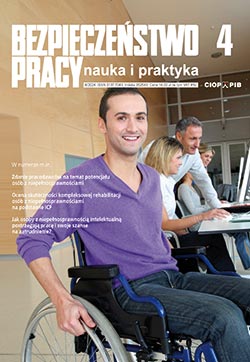Misją Instytutu jest dzialalność naukowo-badawcza prowadząca do nowych rozwiązań technicznych i organizacyjnych użytecznych w kształtowaniu warunków pracy zgodnych z zasadami bezpieczeństwa pracy i ergonomii oraz ustalanie podstaw naukowych do właściwego ukierunkowywania polityki społeczno-ekonomicznej państwa w tym zakresie.
-

Abstracts 2024 -

Abstracts 2023 -

Abstracts 2022 -

Abstracts 2021 -

Abstracts 2020 -

Abstracts 2019 -

Abstracts 2018 -

Abstracts 2017 -

Abstracts 2016 -

Abstracts 2015 -

Abstracts 2014 -

Abstracts 2013 -

Abstracts 2012 -

Abstracts 2011 -

Abstracts 2010 -

Abstracts 2009 -

Abstracts 2008 -

Abstracts 2007 -

Abstracts 2006 -

Abstracts 2005 -

Abstracts 2004 -

Abstracts 2003 -

CODE OF ETHICS & PEER REVIEW PROCEDURE -

GUIDELINES FOR AUTHORS
BEZPIECZEŃSTWO PRACY - MONTHLY (OCCUPATIONAL SAFETY)
NO 7/2020 JULY

CONTENTs
2024 - 2003
2024 - 2003
| Select year | Select issue |



